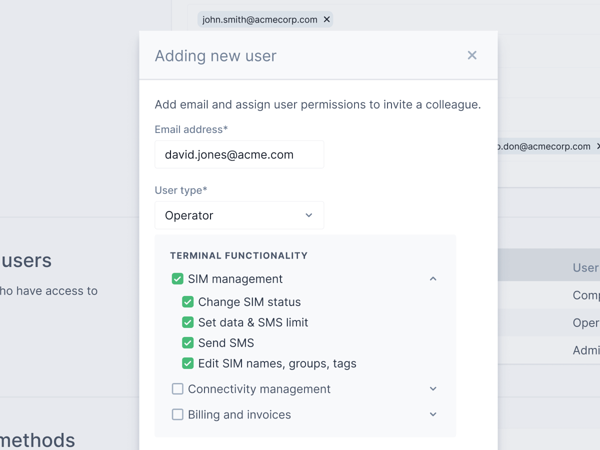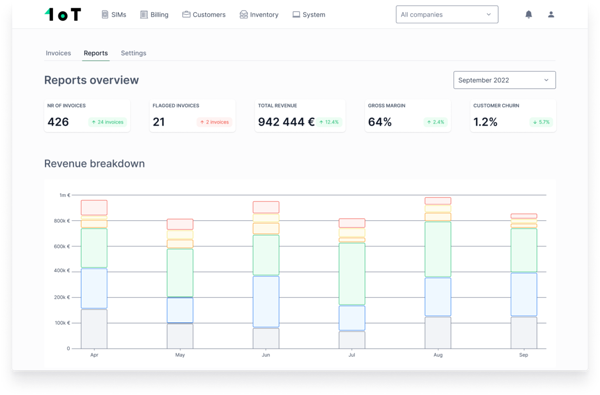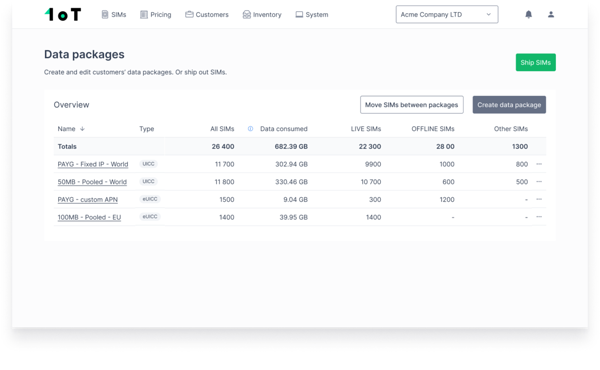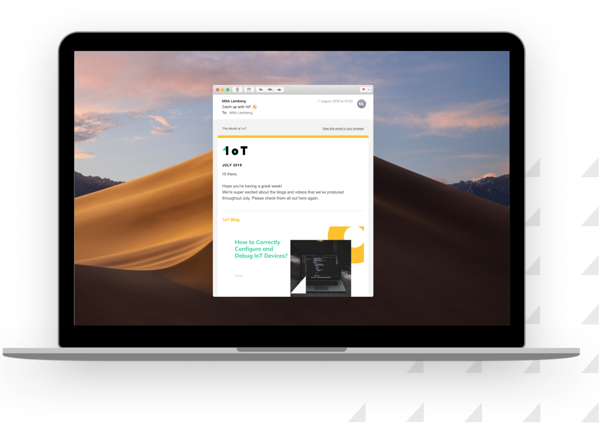Updated on May 2nd, 2024
The world is full of software platforms, and new ones pop up daily. The Internet of Things isn't any different.
Market analysts expect the IoT market to grow over 24% annually until 2032. The growing adoption of IoT technology across industries, such as manufacturing, automotive, and healthcare, drives the market's increase. The progress requires flexible IoT platforms to manage the devices and connectivity.Three primary categories for IoT platforms are:
- application enablement,
- hardware or device management,
connectivity management (CMP).
Each plays a crucial role in the IoT business's lifecycle. As 1oT is a cellular connectivity provider for IoT, we'll explore the world of connectivity management platforms (CMP).
In general, a connectivity management platform combines connectivity services and management tools that enable IoT and M2M projects worldwide. CMPs are needed to activate a SIM card, change data plans, manage billing, monitor cellular service, or deactivate a subscription.
The goal of an IoT connectivity platform is to reduce complexity. But there are many aspects to consider and many ways to achieve this, so follow along to learn more about a modern connectivity management platform's requirements from an IoT device user's perspective and an M(V) NO's perspective.
Why IoT businesses want self-service platforms and why they are needed to scale successfully
A successful IoT deployment typically results in a large number of connected devices around the world. At a global scale, the secret to IoT deployment success is eliminating any possible complexity.
Companies need a self-service platform to efficiently manage their connectivity.
The right CMP allows you to efficiently manage devices and cellular technologies and optimize data rates for efficient IoT deployment.
Standard functions of IoT connectivity management platforms include:
- activating and deactivating SIMs in real-time,
- setting data consumption limits,
- real-time reporting on a SIM level,
- controlling and optimizing connectivity costs,
aggregating data and SMS usage across all SIMs.
eSIM management tool
IoT deployments are often global, so they require flexible global connectivity. This is where the eSIM (eUICC) comes in. eSIM allows users to swap carriers over the air without changing the SIM card in the device.
Unfortunately, you can't enjoy the benefits of eSIM without a proper management tool that allows you to download, enable, and delete eSIM profiles remotely.
1oT's eSIM management tool focuses on the following functionalities:
- a full overview of each eSIM and its carrier profiles,
- ability to compare different carrier profiles,
- swap profiles on the eSIM (download, enable, delete),
- automated eSIM tests to ensure that the IoT module supports eSIM.
APIs are essential for efficient SIM management
Managing SIMs one by one is no longer an option for IoT companies striving to automate their internal processes, including manufacturing and Factory Acceptance Tests (FAT) and deploying devices on a larger scale.
An advanced API allows IoT service providers to successfully move past the initial proof-of-concept phase and scale their operations to new heights.
Save time and resources with powerful automations
Sometimes, devices don't function as they should. They may not connect to the network, consume more data than expected, or experience a drop in connectivity during a network outage.
A reliable CMP can quickly identify and troubleshoot these issues. IoT customers appreciate having the ability to set up workflow automation rules that allow them to specify triggers and follow-up actions.
One widespread problem is thieves using stolen SIM cards to consume vast amounts of data and rack up huge bills. That's why a modern CMP must be able to detect IMEI changes to automatically turn off SIMs that might be stolen. Similarly, the platform should be able to take automatic actions if data consumption is unexpectedly high.
Convenient user access management
User permissions become crucial as the company expands and more people join the product team. For example, what if someone from the finance department needs to review invoices without being involved in SIM management?
Conversely, what if someone tests the hardware but should not access financial information? This is where granular and flexible user permissions come into play. Since modern CMPs contain sensitive information, user access management is critical, especially for IoT companies that must comply with risk assessment policies or ISO 27001 standards.
Background smartness to decrease the manual overhead of managing SIMs
IoT projects are complex and have many components, making monitoring every detail difficult. However, incorporating intelligent technology into the CMP can reduce the need for manual management. For example, a good CMP should learn from usage statistics to detect anomalies.
Data analysis is also time-consuming, but a CMP identifying potential improvement areas can simplify this significantly. This includes listing all active, billable SIM cards that haven't used data in months or detecting SIM cards that frequently switch between multiple networks, leading to service degradation.
What M(V)NOs expect from a CMP
By now, every major mobile operator in the world has embraced the potential of IoT and provides connectivity solutions. Yet, the implementation of IoT services within the current MNO structures and business model can be tricky.
As the creators of 1oT Terminal, we have gained valuable insights into how CMPs should facilitate back-office processes and contribute to the growth of customers and subscriptions.
By collaborating with telecoms that have licensed 1oT Terminal, we have gained valuable insights into the expectations of traditional mobile network operators.
Admin API portal
A comprehensive admin API allows the M(V)NO to connect the information coming from the CMP to their internal systems and programs. This opens up possibilities for creating and managing customers and data packages, uploading SIM information, receiving valuable reports, and much more without leaving the M(V)NO's interfaces.
Scalable customer management and support
M(V)NOs expect their chosen CMP to provide a scalable customer management and support solution for their IoT business.
This is crucial as their goal is to provide excellent service to their customers without needing a large support staff available at all times. Thus, the CMP should be able to streamline and automate processes that make it easier for M(V)NOs to manage their IoT customers more efficiently and cost-effectively.
Introducing a new IoT platform to customers can be time-consuming and often requires a dedicated team to walk them through its features and explain how it works. This takes up a lot of resources that could be better used elsewhere. That's why the CMP should provide a user-friendly onboarding process that requires minimal help from the M(V)NO.
Easy monitoring & reporting capabilities
Simple monitoring and reporting capabilities help M(V)NOs make informed business decisions about their IoT strategy. These capabilities can help identify trends and patterns, which can help them stay competitive in the rapidly evolving IoT landscape.
Automated reporting is an essential feature of a modern CMP that allows M(V)NOs to easily track their IoT traffic, identify popular use cases, and calculate revenue per customer.
In addition, automated reporting streamlines the reporting process and reduces the risk of errors caused by manual data entry. It saves time and resources, allowing M(V)NOs to focus on delivering better customer service, expanding their offerings, and growing their business.
Management of custom network services & product configurations
M(V)NOs typically seek standardized services, but as more customers require unique arrangements, such as custom pricing or dedicated IP ranges, it's important to be able to create custom configurations and changes via a CMP.
These requests often come from large enterprises requiring custom solutions for different deployments rather than all of their SIMs. Ideally, customers should be able to manage these changes themselves, but if business processes require it, account managers can also help and monitor them.
Supporting the rapid growth of IoT
Scalability is also an important factor to consider. As the number of IoT customers grows, the CMP should be able to scale up accordingly. The CMP should be able to support a large number of IoT devices and SIMs without compromising the quality of service.
The 1oT Terminal is a CMP specifically designed for IoT applications, considering the requirements of both the device and connectivity aspects of the industry. Check out our product page and interactive demo.
If you're an M(V)NO looking to simplify managing your IoT customers, contact licensing@1oT.com.







